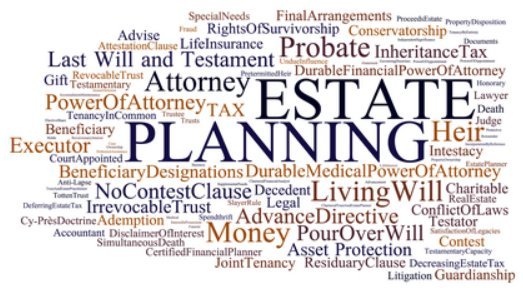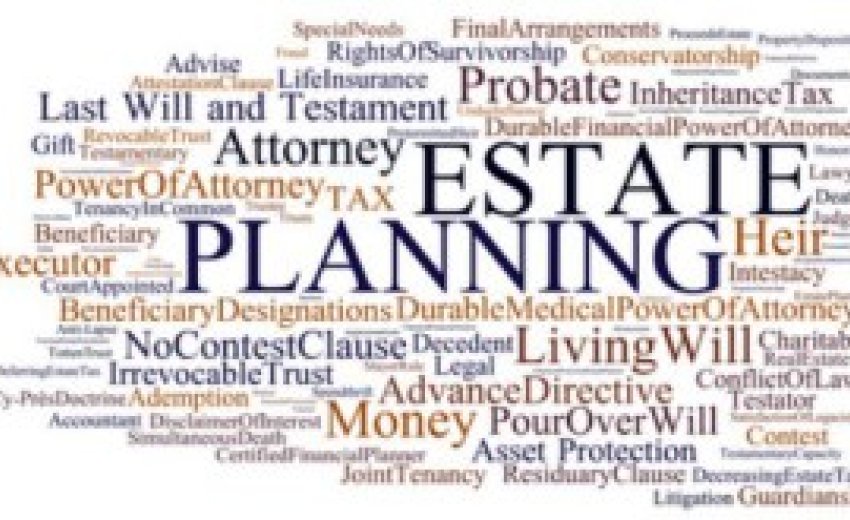10 Essential Estate Planning Facts
 "You may delay, but time will not," Benjamin Franklin. Everyone knows that they need an estate plan, but few of us do anything about it. In fact, according to a recent study, more than 55% of Americans don't even have a simple Will. And yet, the clock is ticking for all of us. So why don't more of us actually put together an estate plan? For some, it's a morbid fear that by thinking about death, we'll hasten it. For some, it's simple procrastination. For many people, though, the problem is not knowing enough about the estate planning process.
"You may delay, but time will not," Benjamin Franklin. Everyone knows that they need an estate plan, but few of us do anything about it. In fact, according to a recent study, more than 55% of Americans don't even have a simple Will. And yet, the clock is ticking for all of us. So why don't more of us actually put together an estate plan? For some, it's a morbid fear that by thinking about death, we'll hasten it. For some, it's simple procrastination. For many people, though, the problem is not knowing enough about the estate planning process.
Here are 10 essential estate planning facts.
-
It's not just for the wealthy. Many people equate estate planning with tax planning. In fact, you may have heard that in 2010 Congress passed a law which increased the estate tax exemption, and that now it is $5.43 million per person, taxing only the wealthiest of Americans. Most of us will not be affected by the estate tax, and it might be easy to think that if you're not going to be taxed, you don't need a plan. This couldn't be further from the truth. Estate planning encompasses so much more than just taxes, as you'll see.
-
Without a plan, the state is in control. If you pass away without an estate plan, you give up control over who inherits your property. Instead, your state's "intestacy" laws kick in, and dictate how your assets are divided up and passed on. Having an estate plan is the only way to ensure that your hand-carved assets go to whom you want, when you want.
-
Without a plan, your children could be in limbo. If you're the parent of young children, the thought of them being cared for by someone you haven't chosen probably terrifies you. And yet, if you don't leave a will nominating a guardian for your minor children, you will have no voice in the decision.
-
Proper planning can protect your children from creditors and lawsuits. If your children inherit your property through your state's intestacy laws (or if you leave property to them outright), that property is vulnerable to their creditors. It's treated just like your kids' other property and earnings, and it can be lost to creditors, lawsuits, and divorce - to name a few possibilities. The solution? You can leave assets to them in a trust, giving them a measure of protection.
-
Proper planning can save your children from their own misjudgments and bad habits. If you're worried about your children having complete control over their inheritance, you can also leave their inheritance in trust and appoint someone else to make decisions about how the money will be used. This can protect your kids from losing their inheritance due to poor decision making, substance abuse problems, or just plain excessive spending.
-
Estate planning is absolutely essential for married couples in which one spouse is a resident non-citizen. Generally, assets that pass between spouses at the first death are free from estate taxes due to the Unlimited Marital Deduction, no matter how large the estate. However, where the surviving spouse is a resident non-citizen, the Unlimited Marital Deduction is not automatically available. Although the government allows all taxpayers to pass a certain amount of assets at death estate tax-free, there can be taxation at the death of the first spouse unless proper estate planning is in place.
-
An estate plan lets you give generously to charity. Do you want part of your estate to go to a favorite charity? Intestacy laws leave no room for charitable contributions. So, the only way to be charitable in death is to create estate plan. And, if you have concerns about taxes, charitable estate planning can afford you tax breaks you otherwise wouldn't qualify for.
-
Sooner is always better. No matter what your stage of life, the time to create an estate plan is now. Making a plan when you're healthy and without an emergency looming, gives you time to explore all your options and make calm, rational choices. Plus, if you wait too long, you might miss the opportunity to plan at all.
-
You don't have to do it alone. Estate planning can be intimidating, and it can also involve some complex rules and laws, creating pitfalls for the inexperienced. A qualified estate planning attorney can help you navigate the process and put an effective plan in place.
-
Estate planning isn't an event, it's a process. Putting an estate plan in place is the first step. After that, it's important to make sure that your plan keeps pace with your life. Changes like marriage, divorce, the birth of a child, or even new laws can make your old estate plan inadequate. Reviewing your plan on a regular basis - and keeping your estate planning attorney up-to-date on any life changes - will help ensure your plan continues to work.
 About Sat Jivan Singh Khalsa
About Sat Jivan Singh Khalsa
For over 40 years our mission at the Khalsa Law Firm has been to fortify families, to protect legacies and to ensure that our clients' dreams are safeguarded. We help our clients make tough decisions to protect their loved ones and then assist their families through the toughest times that life presents. Building his law firm on a foundation of trust, spiritual values, legal expertise and a passion for taking care of people, Sat Jivan Singh Khalsa created an estate planning practice that challenges the status quo of the attorney/client relationship by putting clients first and serving them from the heart. Clients are treated with respect, dignity, consciousness and as valued members of the law firm's "family" while being provided estate plans that ensure true peace of mind.
Since joining the New York Bar in 1974, Mr. Khalsa has combined a superb comprehension of the law with decades of legal experience to provide estate plans that are not only technically sound but also infused with the spirit and the values that define you.
The firm's practice is focused entirely on Estate Planning and Elder Law, and includes an emphasis on Living Trusts, Trust Administration, Probate, Medicaid Planning and Protection, Asset Protection, Charitable Gifting Strategies, Business Succession Planning and Trusts for Children with Special Needs.
As the first Sikh admitted to practice law in the State of New York and the founder and President of the Sikh Lawyers Bar Association, Mr. Khalsa has devoted himself to the cause of advancing Individual and Human Rights. He has served on the FBI/NYPD Joint Task Force Advisory Panels on Civil Rights and Hate Crimes, is a member of the FBI New York Director's Community Engagement Council, has been an international speaker on the cause of world peace and religious tolerance, is a graduate of the FBI Citizen's Academy and is the author of the book "Estate Planning Essentials: a Guidebook for Today's Modern Families."
Mr. Khalsa earned his Juris Doctorate from the Washington College of Law at the American University in Washington DC in 1971. He and his wife live in Manhattan and are the proud parents of two children and four grandchildren. He loves playing golf, traveling, and practicing and teaching yoga. He is a world renowned teacher of Kundalini Yoga which he has been practicing since 1970.
About Our Law Firm
The Khalsa Law Firm is devoted exclusively to estate planning. We are members of the American Academy of Estate Planning Attorneys and offer guidance and advice to our clients in every area of estate planning. We offer comprehensive and personalized estate planning consultations. For more information or attend an upcoming seminar, please contact us at (212) 973-0100 or visit us online at www.khalsalaw.com.
About the American Academy of Estate Planning Attorneys
This article is written by the American Academy of Estate Planning Attorneys. The Academy regularly publishes articles on various estate planning topics as a free resource to consumers. These articles are intended as an overview of basic estate planning topics and issues, and not legal advice. We recommend that you consult with a qualified estate planning attorney to review your goals.
The Academy is a national organization dedicated to promoting excellence in estate planning by providing its exclusive membership of attorneys with up-to-date research on estate and tax planning, educational materials, and other important resources to empower them to provide superior estate planning services to families in their communities. The Academy expects members to have at least 36 hours of legal education each year specifically in estate, tax, probate and/or elder law subjects. For over 23 years, the Academy has been a highly-regarded and sought-after resource for attorneys and consumers alike, and has been recognized by Consumer Reports, Suze Orman in her book, 9 Steps to Financial Freedom and numerous times by Money Magazine.
--------------------------------------------------
Related article:
Impact of Dying Without an Estate Plan
Editor's note: This article was originally published on Oct. 13th 2015
